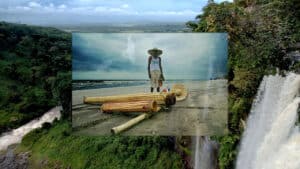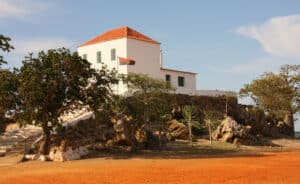
Angola, the queen and my spiritual roots
IQ
- 3 Min Read
In order to offer transparency into how our stories are produced and to teach our readers about the importance of media literacy online, the editorial team provides a quick self-rating of the integrity of the articles and the facts presented against the following IQ metrics.
- Published on July 27, 2022
- Last Updated March 10, 2023
- In Guest Writers
Wrtier Gloria Browne-Marshall went to West Africa in search of a queen and found inspiration.
My trip to Angola, Central Africa, gave me a queen and a spiritual reconnection. As a writer, researching a new book, I traveled to Luanda, Angola, seeking the diplomat and warrior queen known as Nzingha of Ndongo and Matamba (now Angola) born about 1583. I believed my book of true stories about courageous African American women must begin with the Angolan woman known for resisting oppression. Angola provided Queen Nzingha and much more.
Luanda is a bustling port city of nearly 9 million people. Unlike movies and television, there are no elephants wandering the streets. Cars, shopping malls and a skyline of shiny office buildings are the modern reality of wealth mixed with poverty. After informing the hotel clerk that finding Queen Nzingha was my goal, a van took me to her statue. It stands guard at Museu Nacional de História Militar, the Military Museum, a former fort built about 1576. The queen goes by many names, Rainha Jinga, Nzinga, Nzingha and, after she was forced to convert to Catholicism, Ana De Sousa.
This massive fort overlooks the Atlantic Ocean. Built by the enslaved nearly 500 years ago, there are 20th century relics of Angolan wars and a towering statue of Queen Nzingha. This bronze Queen Nzingha, holding a machete, rises over 20 feet, facing intently toward the homeland which she fought to protect. In her presence, I felt a growing pride knowing this fearless woman of intellect devoted everything to trying to stop the slave-trade.
I wandered around the fort and inside a nondescript building were breath-taking porcelain tiles covering every wall. Painted in blue and white, they depicted life before and after the Portuguese invaded. Intricately crafted tiles portray a famous scene from 1622 when Nzingha met with the Portuguese to negotiate a peace treaty on behalf of her brother, the King or Ngola. European men are shown seated, offering no chair to Nzingha. This is an amazing story because Nzingha refused to sit at their feet. Instead, tiles depict Nzingha sitting on the back of her maidservant. Another tiled wall recounts Queen Nzingha’s funeral procession where she is carried, sitting up, to a secret burial site.

Back outside, in another building, I was stunned to see iron bars leading down shadowy to holding cells where enslaved men, women, and children once waited to exit through a door of no return. Kidnapped Angolans were baptized into Catholicism at gunpoint, given Portuguese names and forced onto ships. These Angolans, dispersed across the globe, became seeds of the African diaspora. I held those bars and wept.
As Black women ascend to positions of power today, traveling the world, I think of Queen Nzingha. She led a military offensive against enslavers until her last breath at 80 years of age. My spiritual connection to Angola had grown beyond research. It was as though I had once lived there, and after a long journey abroad, returned. Queen Nzingha had brought me home.
Gloria J. Browne-Marshall is the author of She Took Justice: The Black Woman, Law, and Power, a playwright, essayist, and constitutional law professor at John Jay College (CUNY).
This story was created by Detour, a journalism brand focused on the best stories in Black travel, in partnership with McClatchy’s The Charlotte Observer and Miami Herald. Detour’s approach to travel and storytelling seeks to tell previously under-reported or ignored narratives by shifting away from the customary routes framed in Eurocentrism. The detour team is made up of an A-list of award-winning journalists, writers, historians, photographers, illustrators and filmmakers.
This story was originally published July 27, 2022 9:00 AM.




